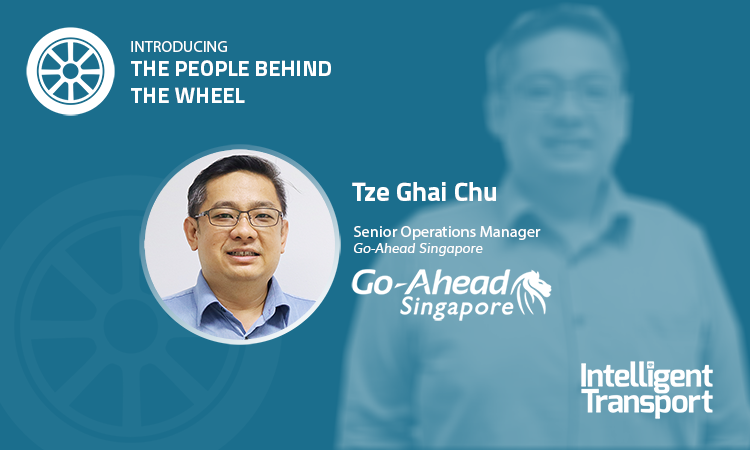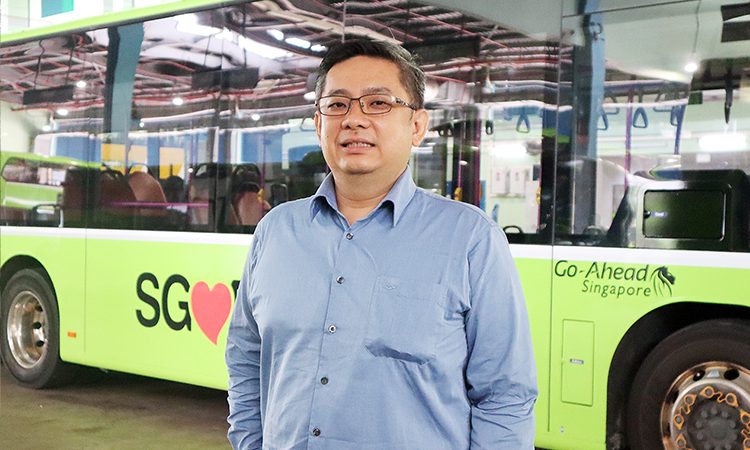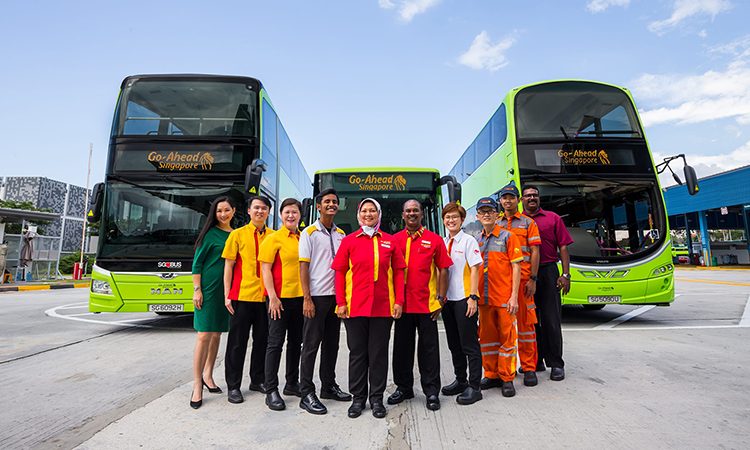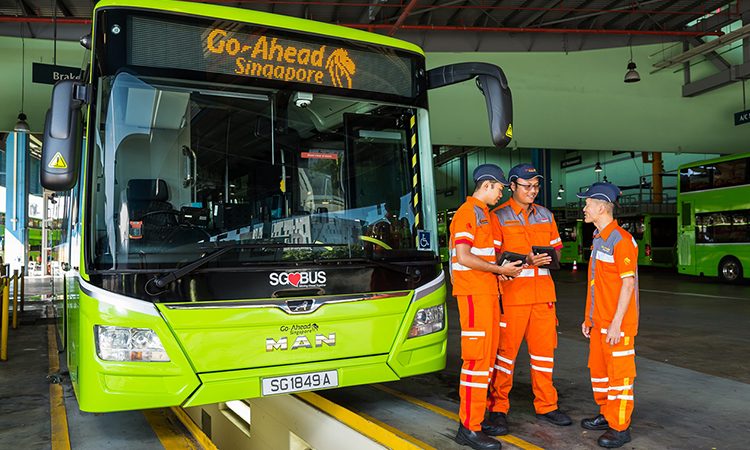The people behind the wheel: Tze Ghai Chu’s story, Go-Ahead Singapore
- Like
- Digg
- Del
- Tumblr
- VKontakte
- Buffer
- Love This
- Odnoklassniki
- Meneame
- Blogger
- Amazon
- Yahoo Mail
- Gmail
- AOL
- Newsvine
- HackerNews
- Evernote
- MySpace
- Mail.ru
- Viadeo
- Line
- Comments
- Yummly
- SMS
- Viber
- Telegram
- Subscribe
- Skype
- Facebook Messenger
- Kakao
- LiveJournal
- Yammer
- Edgar
- Fintel
- Mix
- Instapaper
- Copy Link
Posted: 27 April 2023 | Tze Ghai Chu - Go-Ahead Singapore | No comments yet
For the latest instalment of Intelligent Transport’s exclusive ‘The people behind the wheel’ series, Tze Ghai Chu, Senior Operations Manager at Go-Ahead Singapore, discusses some of the challenges that he encountered while transitioning to a career in transport from the semiconductor industry, as well as why the human touch of bus captains can never be replaced despite all of the technological developments that are currently taking place across the sector.


Can you tell us about your role at Go-Ahead Singapore?
In my role, I work closely with Singapore’s Land Transport Authority (LTA) to deliver safe, reliable and comfortable public transport services for commuters across 31 bus service routes. We manage more than 400 buses from Loyang Bus Depot, supported by a team of over 1,000 colleagues.
I lead the operations here, including our accident prevention (until 2020), customer service and bus interchange teams, comprising managers, executives, supervisors and bus captains. In a multi-faceted role like mine, collaboration is key, as I am required to form cross-functional teams to plan and execute projects of varying complexities. I also set up KPI tracking processes for the teams that are under my management and establish creative solutions utilising data analysis and the Plan-Do-Check-Act (PDCA) model to ensure proper follow-up.
What inspired you to seek a career in the transport industry?
Observing how the overall [public transport] network has significantly improved and advanced over the years, my intrigue continued to grow as to what went on behind the scenes”
Prior to joining the public transport industry, I was in semiconductor manufacturing for many years. Living in Singapore, I have personally enjoyed the structure and reliability of our public transport system as a commuter. Observing how the overall network has significantly improved and advanced over the years, my intrigue continued to grow as to what went on behind the scenes to establish and maintain such an efficient service standard.
The ideal opportunity presented itself when I found out that Go-Ahead Singapore was hiring for the role of a management trainee. It happened at the right time for me, and I applied for the position without hesitation. Thankfully, the multiple rounds of interview that I completed paid off and I was offered the job.
It has been six years since and, as much as I’ve accumulated substantial knowledge and experience in the industry, it is a continuous learning journey, especially with the regular network enhancements.


Credit: Go-Ahead Singapore
Have you experienced any challenges in your role and, if yes, how have you overcome them?
During the initial stages when I switched industries in my career from semiconductor to public transport, I faced challenges in adapting to the way that things were run, as there were many differences in how each operation functions.
In public transport, it is an open environment where we are exposed to a greater number of variables which affect the daily operation. I had to completely reset the way that I approached matters”
In semiconductor industry, we operated in a controlled environment with lesser variables to manage. However, in public transport, it is an open environment where we are exposed to a greater number of variables which affect daily operation. I had to completely reset the way that I approached matters and quickly learn to adapt to unique scenarios and requirements.
Furthermore, the characteristics of the people that are employed in both industries are contrasting. My working style and modes of communication had to be adjusted as I sought to cultivate harmonious working relationships with my new colleagues. Fortunately, the analytical skills and tools that I had acquired from my semiconductor days have served me well in the public transport industry. I have successfully adopted tools – such as the 7 QC, charting, trend analysis and project management – in my daily work processes.
Has a career in transport changed your perception of the industry as a whole?
The passion and dedication of public transport workers had surpassed my expectations. Their efforts and commitment towards providing safe and reliable services to commuters awed me”
Having no prior insight into the public transport industry, it definitely has. Before I joined Go-Ahead Singapore, I considered public transport an industry that entailed hard work and the co-operative effort of many teams. Indeed, it was, and even more so than I thought.
The passion and dedication of public transport workers surpassed my expectations. Their efforts and commitment towards providing safe and reliable services to commuters awed me – the extremely early mornings for those operating first buses and the late nights when shifts for last buses end. Braving weather conditions to report to work punctually and always staying focused behind the wheel. We may not realise it, but their roles are so essential in ensuring that people have a means to get to and from their destinations at most hours of the day and night. And at an outstanding standard and service quality, if I may add.
A constant motivation for me in the industry is knowing that my colleagues and I all work towards one common goal of delivering an excellent public transport service. With the developments and technological advancements channelled towards public transport, it is encouraging to see our mature colleagues continue to learn and adapt to new bus types, automated systems and digital tools.


Credit: Go-Ahead Singapore
What would be the top three highlights of your career in the industry to date?
Firstly, the successful introduction, promotion and adoption of digital applications for all bus captains… These apps significantly improve efficiencies and automate processes”
Firstly, the successful introduction, promotion and adoption of digital applications for all bus captains. Namely BC Click, a bespoke mobile application that has been developed to digitalise the day-to-day manual activities of our bus captains; and remote duty sign-on, an app that facilitates the signing on and off duty for our bus captains at any location with a company-issued mobile phone. These apps significantly improve efficiencies and automate processes, such as the physical signing on and off duty at the despatch office or paperwork for incident reporting.
However, it was challenging to get more than 800 bus captains on-board to learn how to use them and maximise the apps’ benefits to save them time and effort. We had organised regular briefing sessions, deployed mentors to provide guidance and produced user guide books to support them in effectively adopting the new technology. It is very satisfying to see how well-received and widely used the apps are now, as well as the positive attitudes of our bus captains who have been more receptive to adopting new technologies.
Secondly, the COVID-19 pandemic took us by surprise, and no one could have predicted the impact that it had. The rapid implementation of safe management measures, work from home arrangements, colleagues contracting the virus, to name a few. Daily operations were greatly affected, and we had to quickly respond to the evolving and uncertain situation. Furthermore, we have Malaysian bus captains who cross the border every day to report for work. Therefore, the border closure between Singapore and Malaysia was a pressing issue that we had to promptly resolve. Accommodation was sought and arrangements made for our Malaysian colleagues to stay in Singapore instead of commuting daily – an option offered to them if they chose to stay.
The COVID-19 pandemic took us by surprise, and no one could have predicted the impact that it had… The organisation and co-ordination during this period were massive in order to ensure that we continued to deliver safe and reliable bus services”
The organisation and co-ordination during this period were massive in order to ensure that we continued to deliver safe and reliable bus services. I’m thankful for the co-operation of my colleagues; it is the one-team effort that made it possible for us to overcome this unprecedented hurdle together.
Lastly, launching our new Pasir Ris Bus Interchange during the pandemic is one of my most memorable events. The re-configured design of the premises included an additional concourse area and end-on boarding berths, which was a different layout from the berths at the previous interchange. It certainly was a different experience working remotely with multiple stakeholders, like the authorities and social service agencies, to plan and implement the opening of the new interchange. Internally, our teams were all hands-on-deck to support the launch, ensuring that bus captains were trained and familiarised with the new layout, implementing safe management measures and making sure that the premises was safe and fit for public use.
Where do you see yourself in five years’ time?
In five years’ time, I see myself progressing further in the public transport industry. With the progressive electrification of buses, there will be many changes required to how daily bus operations are run. I would like to be a part of the team that builds the most efficient process of operating these buses and, later, potentially autonomous buses.


Credit: Go-Ahead Singapore
What key pieces of advice would you give to someone who is interested in a career in transport?
If you are keen to explore a career in this industry, you must keep an open mind, have a positive attitude and be passionate towards your goals”
This is an industry with plenty to offer and long-term development strategies as outlined in the Land Transport Master Plan 2040. If you are keen to explore a career in this industry, you must keep an open mind, have a positive attitude and be passionate towards your goals.
It involves interaction with people from all walks of life – the authority, the management, the supervisors, the bus captains, the customer service, the service controller, the engineers and the technicians, as well as corporate staff. It will be fulfilling to contribute to the success of Singapore’s world class public transport network and make a tangible difference in commuters’ journeys.
In the future, what do you hope to see become more commonplace in the transport industry workforce?
Public transport comprises of many experienced workers who have a wealth of knowledge… it is my wish that their valuable expertise is systematically passed down to the younger generation”
I hope to see more of the younger generation choosing to join this exciting industry. Furthermore, the majority of the workforce is currently male, so I hope that it will become increasingly more balanced, with a larger number of females entering the industry.
Public transport comprises of many experienced workers who have a wealth of knowledge and skillsets that have been honed over the years. Thus, it is my wish that their valuable expertise is systematically passed down to the younger generation, so that it is not lost as they retire from the industry.
In an ideal world, what do you hope the future of public transport will look like?
Amidst all the progression, we can never replace the human touch. Sometimes, just a simple hello or a warm smile from the friendly neighbourhood bus captain could turn one’s day around”
In an ideal world, I imagine that public transport would become more autonomous in the future. A system that will provide a new level of reliability, safety and comfort that has not been reached before. A place where artificial intelligence (AI) and machines co-exist with bus captains to take the network to greater heights.
The role of a bus captain has evolved considerably and continues to develop with regular training. They remain well-placed to meet the demands of the industry and possess the capabilities to work with future technologies. Amidst all the progression, we can never replace the human touch. Sometimes, just a simple hello or a warm smile from the friendly neighbourhood bus captain could turn one’s day around. This is something that technology alone is unlikely to achieve.


Related topics
Mobility Services, Passenger Experience, Public Transport, Staff & Skills Development, Sustainable Urban Transport, The People Behind the Wheel Series, Workforce Inclusivity, Workplace
Related modes
Bus & Coach
Related countries
Singapore
Related organisations
Go-Ahead Singapore
Related people
Tze Ghai Chu








